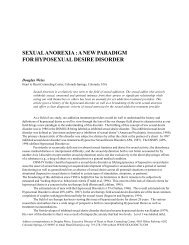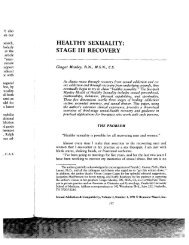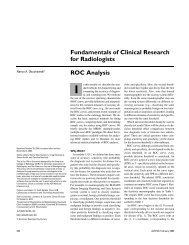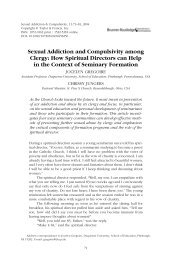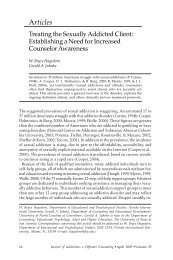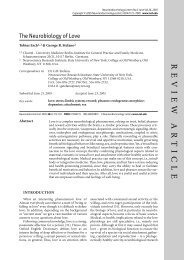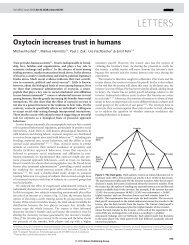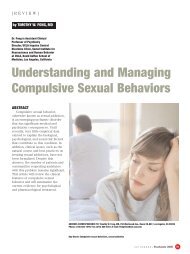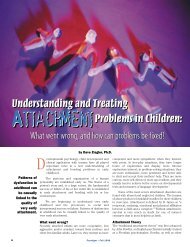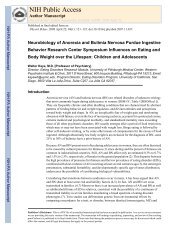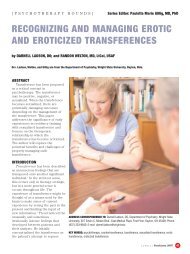An Overview of Psychiatric Ethics
An Overview of Psychiatric Ethics
An Overview of Psychiatric Ethics
Create successful ePaper yourself
Turn your PDF publications into a flip-book with our unique Google optimized e-Paper software.
Applied <strong>Psychiatric</strong> <strong>Ethics</strong>3to be “all things to all people”. 385 Indeed, it has been argued elsewhere that by virtue <strong>of</strong> its broadperspective, C-L psychiatry has a credible role providing ethical guidance in difficult clinicalsituations. 386, 387 Such circumstances create a tension between the expectations <strong>of</strong> the patientand that <strong>of</strong> the referring physician or indeed the institution itself., It has been claimed that in someinstances interventions by the C-L psychiatrist are directed at the staff, rather than the patient,creating a “bipolarity <strong>of</strong> practice”. 388 Interventions such as a reframing <strong>of</strong> a patient’s challengingbehaviour on a medical ward serve to improve the functioning <strong>of</strong> the therapeutic relationshipbetween the patient and other health pr<strong>of</strong>essionals by engendering an attitudinal shift in the staff ona medical ward. This <strong>of</strong>ten makes use <strong>of</strong> what has been described as a “situational diagnosis”, 389in which a diagnostic statement, integrating multiple perspectives <strong>of</strong> a situation regarding a patient,is made in order to help resolve a therapeutic impasse on a medical ward. <strong>An</strong> example is thefrequent use <strong>of</strong> the diagnosis <strong>of</strong> “adjustment disorder” in C-L settings, in which the emphasis on theoverwhelming stressor <strong>of</strong> a physical health crisis removes the focus from the patient’s more difficultinterpersonal behaviours.53C-L Psychiatrists and Medical Decision MakingC-L Psychiatrists <strong>of</strong>ten encounter broader dilemmas in medical ethics in their liaison roles withinmedical units. C-L psychiatrists routinely assess patients for their suitability for transplantation, andwhile such evaluations are not the ultimate arbiter <strong>of</strong> the allocation <strong>of</strong> transplant resources, they arehighly influential. A particularly contentious instance <strong>of</strong> this is the assessment <strong>of</strong> patients for livertransplants, particularly following paracetamol overdose. This is a vexed area, as this frequentlyrepresents an end-<strong>of</strong>-life decision given the fulminant nature <strong>of</strong> paracetamol induced hepatotoxicity.C-L psychiatrists are <strong>of</strong>ten requested to consult in clinical situations, in which a patient with a severe,life-threatening illness refuses treatment. In some circumstances, such refusal occurs against thebackground <strong>of</strong> an acute confusional state or severe mood disorder, where there are clear grounds toregard the patient’s refusal as being attributable to the effects <strong>of</strong> such illnesses.In other circumstances, C-L psychiatrists sometimes find themselves in the midst <strong>of</strong> controversialclinical situations such as the procurement <strong>of</strong> late-term termination <strong>of</strong> pregnancy. 390 In these settings,the C-L psychiatrist is asked for a clinical opinion on the prospective psychological effects <strong>of</strong> theprocedure occurring or not. Whilst this information is not, <strong>of</strong> itself, ethical, it may be highly influentialin the final clinical decision. As such, psychiatric opinions require careful reflection on the potentialinfluences impacting on their formation, including pressures on the part <strong>of</strong> the patient or otherclinicians to obtain a speculative statement <strong>of</strong> psychological impact, which will facilitate a particulardecision.<strong>Ethics</strong> and Transcultural Psychiatry<strong>Psychiatric</strong> diagnosis occurs in a specific cultural context. The cultural background <strong>of</strong> thepsychiatrist and the patient influence how specific observations <strong>of</strong> the patient are interpreted. Inthe sociological literature, the concept <strong>of</strong> “cultural relativism” is frequently discussed in relationto psychiatric diagnosis and treatment. Cultural relativism is the view that the normative mores,customs and practices <strong>of</strong> particular cultures can only be truly known within the culture in whichthey are occurring. In other words, the alien observer cannot know or understand the norms <strong>of</strong> aparticular culture. Applied to the concept <strong>of</strong> mental disorder, cultural relativism takes the position thatmental disorders are social constructs. A social construct is an idea, which may appear to be naturaland obvious to those who accept it, but in reality is an invention or artefact <strong>of</strong> a particular culture orsociety. The implication <strong>of</strong> this view is that social constructs are in some sense human choices ratherthan natural phenomena. 391 Social constructions are, by nature, processes which are historically andsocially contextual and inform both knowledge and action. 392Ruth Benedict’s classic book Patterns <strong>of</strong> Culture 393 provided an anthropological foundation <strong>of</strong> theprocess <strong>of</strong> social constructionism and cultural relativism in defining psychiatric disorder. Benedictobserved that each culture chooses a few characteristics, which become normative for it. Fromthe position <strong>of</strong> cultural relativism, each culture thus creates its own moral imperatives that can beunderstood only if one studies that culture as a whole. Normality or morality is relative to the values<strong>of</strong> the culture. A person whose behaviour or views are deviant from the rest <strong>of</strong> the culture (or aIMET AN OVERVIEW OF PSYCHIATRIC ETHICS



